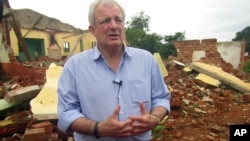Thousands of people uprooted by violence in the Central African Republic are taking refuge in a hospital after armed groups looted and burned a camp for the displaced, medical charity Doctors Without Borders said Thursday.
At least 10,000 people are staying on the grounds of the hospital in Batangafo — 400 kilometers (250 miles) north of the capital, Bangui — nearly two weeks after fighting broke out between rival groups, according to the charity, known by its French initialism of MSF.
The camp for the displaced was attacked and several aid groups were looted during two waves of violence that left 24 people dead and 17 injured as of the start of August, MSF said.
"The people taking refuge in the hospital ... are still unable to rebuild their shelters in the camp," MSF project coordinator Carlos Francisco said in a statement.
The medical charity said it was providing basic water and sanitation services for the displaced, and that health services were running as normal after having been disrupted by the fighting.
"Much of the general population is in a state of complete helplessness," Francisco added. "Imagine what the situation must be like when people think that the only safe option left to them is a hospital ... knowing that not even hospitals are safe."
Patients abducted, baby slain
Hospitals in the southeastern towns of Bangassou and Zemio have been targeted by militant groups in recent months — with armed men abducting two patients who were later found dead, and shooting and killing a baby being held by its mother, MSF said.
Six Red Cross volunteers were killed last week in an attack on a health center in southeastern Gambo, the aid group said, adding that civilians and health workers might have also died.
Thousands have died and a fifth of Central Africans — nearly 1 million — have fled their homes in an ethnic and religious conflict that broke out after mainly Muslim Seleka rebels seized power in 2013, provoking a backlash from Christian militias.
Militia violence has intensified across the Central African Republic this year as splinter groups clash over control of land and resources, sparking fears of a return to the large-scale chaos that gripped the country at the peak of a 2013 civil war.
U.N. aid chief Stephen O'Brien on Monday told a U.N. briefing that the "warning signs of genocide are there."
O'Brien last month told the Thomson Reuters Foundation that the country has "the worst level of humanitarian needs per capita," as about one in two people — 2.2 million — need aid.





